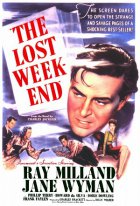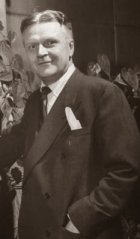
The Lost Weekend Page #12
- NOT RATED
- Year:
- 1945
- 101 min
- 966 Views
WICK'S VOICE
He probably couldn't get to the right
people right away, missed a train.
You know how it is.
HELEN'S VOICE
Oh, it would be just wonderful if he
got the job and started working. Or
would it, Wick, with him in
Philadelphia and me in New York?
B-35 LIVING ROOM - WICK AND HELEN
HELEN:
Don't ever tell him I said that
though, will you?
WICK:
Of course not.
Suddenly his eyes are transfixed. From under the couch has
rolled the bottle. As Helen speaks, he tries to get near it
without her noticing.
HELEN:
I could never understand why somebody
like Don, a person with so much
talent, such flashes of real
brilliance... Maybe I'm a little
prejudiced.
Suddenly she sees Wick trying to kick the bottle back under
the couch.
HELEN:
What are you doing, Wick?
WICK:
Nothing, Helen.
HELEN:
Where'd that bottle come from?
WICK:
It just rolled out.
HELEN:
From under the couch?
WICK:
Yes, Helen.
(With an attempt at
casualness)
It's my guess that Don caught an
early train.
HELEN:
(A wild guess)
Is that Don's bottle?
WICK:
HELEN:
There was a bottle the first time we
met.
WICK:
There was?
HELEN:
It fell out of Don's pocket.
WICK:
It was for me, Helen.
He stands with his head against the door post, listening,
harassed.
WICK'S VOICE
This one is mine, too. You might as
well hear the family scandal. I drink.
B-37 WICK AND HELEN IN THE LIVING ROOM
WICK:
He walks over to the records and picks up the glass.
WICK:
I had to promise I'd go on the wagon.
That's why I hid the bottle, so he
wouldn't see it.
He takes a drink.
HELEN:
I'm so sorry, Wick. I shouldn't have
started asking questions. It was
none of my business.
WICK:
Forget it.
His brother's gesture has shaken him.
HELEN'S VOICE
I'd better be getting back to the
hotel. Don may be there already. And
don't worry, Wick, I won't mention
this to him.
WICK'S VOICE
Thank you, Helen.
HELEN'S VOICE
Goodbye, Wick.
WICK'S VOICE
Goodbye.
She must be on her way to the front door. With sudden decision
Don opens the door to the living room and walks slowly out.
DON:
Helen!
B-39 LIVING ROOM & ENTRANCE HALL
Almost at the door to the entrance hall, Helen turns back.
Wick stands, the glass of whiskey in his hand, startled taut
at the sight of Don who comes in, not too steady on his feet.
DON:
I'm sorry, Helen. I can't let you
go. Not like that.
HELEN:
Don!
WICK:
Shut your mouth, Don.
(To Helen)
I'll take you downstairs.
DON:
Thank you very much for your
Philadelphia story, Wick. Nice try.
Helen comes back into the room, staring at Don. She is
beginning to realize that he's drunk. Don looks at the glass
in Wick's hand.
DON:
He takes the glass out of Wick's hand.
WICK:
(To Helen)
Don't listen to him.
DON:
You don't have to. Just look at the
two of us.
HELEN:
Yes. What's all this covering up?
WICK:
All that happened is that Don was
nervous at the idea of meeting your
parents and so he took a couple of
drinks.
DON:
Come on, Wick, she'd have found out
sooner or later.
HELEN:
Stop it, both of you. Don's a little
tight. Most people drink a little. A
lot of them get tight once in a while.
DON:
Sure. The lucky ones who can take it
or leave it. But then there are the
ones who can't take it, but can't
leave it either. What I'm trying to
say is I'm not a drinker. I'm a drunk.
They had to put me away once.
WICK:
He went to a cure.
DON:
Which didn't take. That first day we
met, you see, the dirty trick was I
should have had the decency to get
drunk, just for your sake.
HELEN:
For my sake? We're talking about
you.
(Turning to Wick)
Is it really that bad, Wick?
DON:
Yes, it is.
WICK:
Can't we go over this tomorrow, Don
when you're feeling more like
yourself?
DON:
Helen's heard the facts. That's all
there is to it.
HELEN:
I've heard them and they're not very
pleasant. But they could be worse.
After all, you're not an embezzler
or a murderer. You drink too much.
That's not fatal. One cure didn't
take. There are others.
WICK:
DON:
This has a familiar ring.
HELEN:
There must be a reason why you drink.
The right doctor can find it.
DON:
I'm way ahead of the right doctor. I
know the reason. The reason is me.
What I am. Or, rather, what I'm not.
HELEN:
What aren't you that you want to be,
Don?
DON:
A writer. Silly, isn't it? You see,
in college I passed for a genius.
They couldn't get out the college
magazine without one of my stories.
Boy, was I hot. Hemingway stuff. I
reached my peak when I was nineteen.
Sold a piece to the Atlantic Monthly.
It was reprinted in the Readers'
Digest. Who wants to stay in college
when he's Hemingway? My mother bought
me a brand new typewriter, and I
moved right in on New York. Well,
the first thing I wrote, that didn't
quite come off. And the second I
dropped. The public wasn't ready for
that one. I started a third, a fourth,
only about then somebody began to
look over my shoulder and whisper,
in a thin, clear voice like the E-
string on a violin. Don Birnam, he'd
whisper, it's not good enough. Not
that way. How about a couple of drinks
just to put it on its feet? So I had
a couple. Oh, that was a great idea.
That made all the difference. Suddenly
I could see the whole thing -- the
tragic sweep of the great novel,
beautifully proportioned. But before
I could really grab it and throw it
down on paper, the drink would wear
off and everything be gone like a
mirage. Then there was despair, and
a drink to counterbalance despair,
and one to counterbalance the
counterbalance. I'd be sitting in
front of that typewriter, trying to
squeeze out a page that was halfway
decent, and that guy would pop up
again.
HELEN:
What guy? Who are you talking about?
DON:
The other Don Birnam. There are two
of us, you know:
Don the drunk andDon the writer. And the drunk will
say to the writer, Come on, you idiot.
Let's get some good out of that
portable. Let's hock it. We'll take
it to that pawn shop over on Third
Avenue. Always good for ten dollars,
for another drink, another binge,
another bender, another spree. Such
humorous words. I tried to break
away from that guy a lot of ways. No
good. Once I even bought myself a
gun and some bullets.
(He goes to the desk)
I meant to do it on my thirtieth
birthday.
He opens the drawer, takes out two bullets, holds them in
the palm of his hand.
DON:
Here are the bullets. The gun went
for three quarts of whiskey. That
other Don wanted us to have a drink
first. He always wants us to have a
drink first. The flop suicide of a
flop writer.
WICK:
All right, maybe you're not a writer.
Why don't you do something else?
DON:
Yes, take a nice job. Public
accountant, real estate salesman. I
haven't the guts, Helen. Most men
lead lives of quiet desperation. I
can't take quiet desperation.
Translation
Translate and read this script in other languages:
Select another language:
- - Select -
- 简体中文 (Chinese - Simplified)
- 繁體中文 (Chinese - Traditional)
- Español (Spanish)
- Esperanto (Esperanto)
- 日本語 (Japanese)
- Português (Portuguese)
- Deutsch (German)
- العربية (Arabic)
- Français (French)
- Русский (Russian)
- ಕನ್ನಡ (Kannada)
- 한국어 (Korean)
- עברית (Hebrew)
- Gaeilge (Irish)
- Українська (Ukrainian)
- اردو (Urdu)
- Magyar (Hungarian)
- मानक हिन्दी (Hindi)
- Indonesia (Indonesian)
- Italiano (Italian)
- தமிழ் (Tamil)
- Türkçe (Turkish)
- తెలుగు (Telugu)
- ภาษาไทย (Thai)
- Tiếng Việt (Vietnamese)
- Čeština (Czech)
- Polski (Polish)
- Bahasa Indonesia (Indonesian)
- Românește (Romanian)
- Nederlands (Dutch)
- Ελληνικά (Greek)
- Latinum (Latin)
- Svenska (Swedish)
- Dansk (Danish)
- Suomi (Finnish)
- فارسی (Persian)
- ייִדיש (Yiddish)
- հայերեն (Armenian)
- Norsk (Norwegian)
- English (English)
Citation
Use the citation below to add this screenplay to your bibliography:
Style:MLAChicagoAPA
"The Lost Weekend" Scripts.com. STANDS4 LLC, 2024. Web. 25 Dec. 2024. <https://www.scripts.com/script/the_lost_weekend_173>.



Discuss this script with the community:
Report Comment
We're doing our best to make sure our content is useful, accurate and safe.
If by any chance you spot an inappropriate comment while navigating through our website please use this form to let us know, and we'll take care of it shortly.
Attachment
You need to be logged in to favorite.
Log In